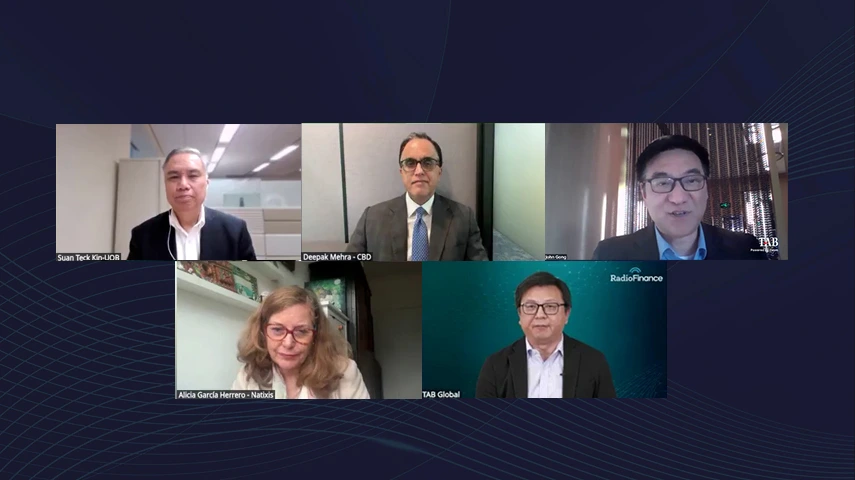Interviewed by Foo Boon Ping
Senior executives and heads of transaction finance and risk management in Asia Pacific discussed cross-border cash management, trade and supply chain challenges and opportunities amid an increasingly complex risk landscape. The rise in global inflation and interest rates, precipitated largely by supply chain disruptions and shocks from COVID, a worsening geopolitical landscape and retrenchment in globalisation, has increased market uncertainties and elevated risks on multiple fronts, across country, credit, cyber, interest rate, liquidity, market, operational and political dimensions.
Sebastien Avot, Atul Jain and Marc Recker of Deutsche Bank, Adrian Ong and Ng Poh Yee of United Overseas Bank, Ashutosh Kumar of Mizuho Bank, Kai Fehr, Michael Sugirin and Pradeep Nair of Standard Chartered, Venkat ES and Parvez Aziz of Bank of America, Amit Talgeri of Axis Bank Limited, Tareq Refat Ullah Khan of BRAC Bank Limited, John TM Wong of Hang Seng Bank, Shekhar Bhandari of Kotak Mahindra Bank, Yap Kwee Hong of OCBC Bank and Nguyen Thi Quynh of Techcombank discussed the evolving dynamics of shifting global trade and supply chain flows, the future of correspondent banking amid heightened demand for speed, safety, security and transparency of cross-border payments. The important role of government-to-government collaboration to remove barriers and facilitate the digitalisation of cross-border trade and settlement. The overarching theme of incorporating ESG and sustainability factors into trade and supply chain financing operations was also on everyone’s mind.
Avot brought up how geopolitical imperatives have once again elevated regulatory compliance requirements and increased the cost of cross-border transaction processing and monitoring. Increased limits set on credit appetite of intermediary institutions have also resulted in rationalisation of key accounts and relationships.
Ong highlighted the opportunity costs of maintaining idle cash balances and how working capital advisory solutions could help businesses manage cash payments and collections effectively and provide much needed visibility across regional and global accounts.
Recker discussed how today’s cross-border payment, largely facilitated on SWIFT network, is one of the industry’s biggest assets but also the biggest problem. Common international standards for interoperability are still required to drive a revolution in cross-border payments. Wholesale settlement predicated on a common, international payment infrastructure such as blockchains or multi-CBDC (mCBDC) built across different central banks offers promise but has so far limited use-case and reach.
Ng talked about digital solutions resulting from COVID as enablers to accelerate supply chain finance but cautioned about the lack of standards, scale and data quality. Kumar observed the evolution of “just-in-time” to “just-in-case” inventory and the end of longer supply chains, pointing to ‘localisation’ and shrinking proximity between procurement and consumption activities.
The following key points were discussed:

Customers in Malaysia increasingly expect international payments to be as seamless as local transfers. At a closed-door roundtable convened by TAB Global with Visa, participants examined how banks are adapting to these expectations while…

At the Temenos Regional Forum Asia Pacific in Manila, Chi Li’s keynote and a panel discussion with Frankie Wai, Foo Boon Ping and Neil Tan examined how banks are approaching AI adoption with increasing caution, embedding governance from…

The Japan Banking Innovation Conference 2025, held at The Westin Tokyo, convened over a hundred senior banking executives, fintech leaders, policymakers and technology pioneers to discuss the fundamental shifts redefining financial services.

As the global banking industry braces for a challenging 2025, it faces economic headwinds, geopolitical tensions, trade realignments, and the push for sustainability and technological innovation

The AWS Financial Services Symposium Singapore 2024 showcased how AI, data, and cloud technologies are revolutionising financial services. Industry leaders from AWS and HSBC shared insights into advancing innovation, regulatory responsibility…

By continuing to browse this website, you agree to our privacy policy.